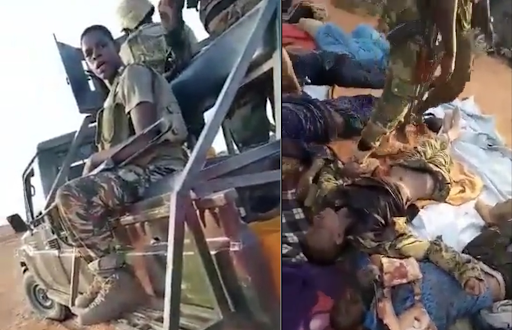Fact-check: Did Nigerian Forces Kill Foreigners Looking For Minerals In Lake Chad?
A viral video is being misrepresented to suggest the presence of Westerners fighting for Boko Haram.

A video is being shared online alongside claims that it shows Nigerian military forces with dead Canadian and French nationals among Boko Haram insurgents. A review shows a different story, likely involving soldiers from neighbouring Niger.
On Twitter, several accounts uploaded over one-minute long footage between Thursday and Friday, Jan. 6, showing many armed soldiers standing beside insurgent casualties and motorcycles.
One account, @IjeleSpeaksNaij, shared the video with a caption stating that Western nationals were amongst Boko Haram fighters killed by the Nigerian forces. The Twitter user added, “BH [Boko Haram] has nothing to do with the establishment of an Islamic caliphate, this has always been for uranium, gold and other mineral resources in the Lake Chad basin and other parts of Africa.”
The post had over 560 retweets and had been viewed nearly 80,000 times, while the video itself had over 20,000 views as of Friday afternoon.
Adamu Garba, a former Presidential aspirant, sharing the post with his over 90,000 followers, claimed that “French, Canadian Citizens [were] identified as part of Boko Haram fighters. They are here to steal & plunder our resources yet you call them Islamic. Boko Haram is a colonial asset.”
He subsequently connected the post to the Lake Chad policy of the presidential candidate of the ruling party, stating that “there can be no better time than now to recharge & resuscitate Lake Chad. That’s why we need Bola Tinubu…”
Another Twitter account, @MirrorAfricaTV, posted a similar text about the foreigners and conflict in the region being about mineral resources. The post had more than 37,200 views and 129 retweets, while the video had over 12,800 views as of 1:15 p.m. on Friday.
Single cabin chocolate camouflage pattern truck with Nigerien soldiers outside Agadez. The truck is similar to the one in the viral video. Photograph: Zohra Bensemra/Reuters
Video not shot in Nigeria
Some of the soldiers in the video can be heard speaking Hausa as they moved around the sandy desert terrain to assess the dead insurgents on the ground and equipment.
The soldier recording could be heard saying “they can’t do anything” before moving towards a motorcycle fitted with a machine gun mount. The same soldier and a colleague would later refer to some of the Arab-looking bodies as “Canadian”; the reason for this is unclear.
Hausa is widely spoken in northern Nigeria. However, speakers of the language are also present in Western Africa, including regions in southern Niger.
The Nigerien military is battling Al-Qaeda and Islamic State affiliate groups in the Lake Chad region and along the three border zones of Burkina Faso, and Mali. The country is also confronting armed groups along the border with Northwestern Nigeria.
The chocolate colour camouflage pattern Lancruisers pick up with a single cabin is similar to those in the inventory of the Nigerien military. The soldiers also wear distinct multiple-pattern camouflages not used by the Nigerian military but resemble those used in Niger.
The environment in the viral video is similar to pictures released in July 2021, showing the aftermath of a Nigerien counterattack against ISGS in the village of Tchomabangou in the Tillaberi Region.
The Nigerian authorities had reported the killing of 40 terrorists and the seizure of 14 motorcycles during the incident.
The number and type of motorcycles from the pictures and recently circulating video bear some resemblance. Also, one of the motorcycles with a configuration for mounting a machine gun was visible in both incidents. The casualties are placed on an identical white material, indicating the video was likely taken after the Nigeriens pushed back the attack.
Support Our Journalism
There are millions of ordinary people affected by conflict in Africa whose stories are missing in the mainstream media. HumAngle is determined to tell those challenging and under-reported stories, hoping that the people impacted by these conflicts will find the safety and security they deserve.
To ensure that we continue to provide public service coverage, we have a small favour to ask you. We want you to be part of our journalistic endeavour by contributing a token to us.
Your donation will further promote a robust, free, and independent media.
Donate HereStay Closer To The Stories That Matter




